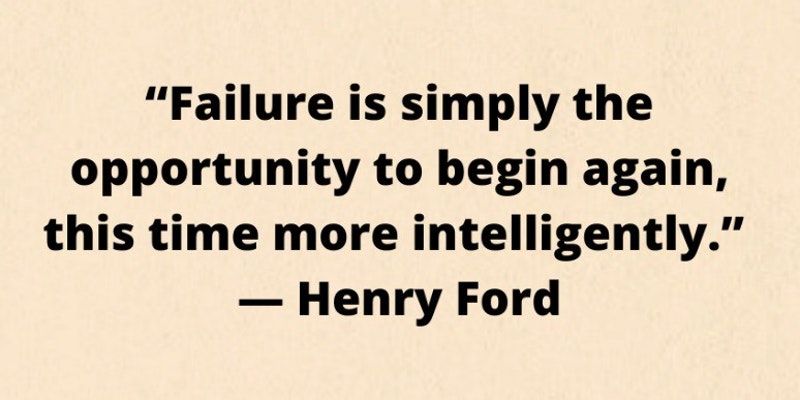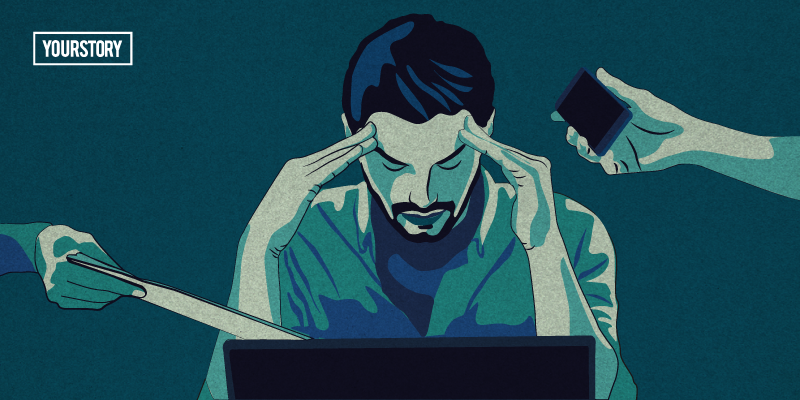The 1992 Olympic Games in Barcelona, Spain. Clouds hang heavy. A rapt crowd waits for. It &#x 2019; s the 400m sprint semi-finals. The professional athletes line up. One guy is pipped to be the #x &preferred 2014; sprinter Derek Redmond, a world-record holder.
As the weapon pops, Redmond, a champ sprinter looks guaranteed, going for the last surface. With 100m to go, Redmond pulls his hamstring and goes down in misery. Easily, his Olympic dreams concerned a stumbling stop.
Yet, in minutes that would redefine the significance of nerve, he chooses himself up, weeping in discomfort, and assisted by his daddy hobbles to the goal. A moved crowd offers him a standing ovation.

 Also ReadThe 11 kinds of company failure &#x 2013; and how you can gain from the errors of others
Also ReadThe 11 kinds of company failure &#x 2013; and how you can gain from the errors of others
Derek &#x 2019; s story is among the most motivating stories. By the standard procedure of success, Derek stopped working. He was disqualified due to outdoors support. Derek didn &#x 2019; t take part in another Olympics after that injury. Video of that impressive race was utilized by Nike in its &#x 2018; Courage &#x 2019; commercials, by Visa, and the International Olympic Committee.
He would go on to end up being an individual fitness instructor, an inspirational speaker, and begin a sports devices producing business, continuously changing the seeds of that failure into larger opportunities of success.
And then, there is an old story of Angulimala &#x 2014; the relentless outlaw who developed a pendant from the thumbs of his victims. When Angulimala fulfilled the Buddha, he is thought to have actually been filled with regret for his acts, changing his life after that and ending up being one of his biggest disciples. There are lots of remarkable stories like these not simply in sports or in folklore, however likewise service.
Walt Disney applied for personal bankruptcy when he remained in his early twenties prior to reversing to develop among the world &#x 2019; s most effective home entertainment business.
Steve Jobs was fired from the business he established just to come back to take the helm and bring it to extraordinary heights.
My point &#x 2014; motivating as these stories #x &are 2014; is not simply to offer inspiring succour however to consider our failures, our losses, and endings as reflective points on our life &#x 2019; s expert and individual journeys. Failure can shake us. Failure can be beating, however it need not be crippling. How can we utilize failure as transformational triggers in our life?The power of reflection
All improvement originates from deep reflection. A change typically happens from a uneasy or uncomfortable circumstance that triggers us to assess the occasion in manner ins which cause alter. In this case, an unpleasant circumstance can be a start-up that stopped working. Or a relationship that is going to pieces. Or a task that we lost. An interview that we #x &didn 2019; t clear. We then select our future actions based upon our battles with that circumstance.
John Maxwell, in his book, Failing Forward, makes the significant point that effective individuals take a particular method to failure. They tend to take obligation for their actions, gain from the errors, comprehend that failure becomes part of the knowing procedure of life itself, and regardless of the worry of failure, continue to stand firm and take threats. Maxwell, in the book, called this method &#x 201C; stopping working forward. &#x 201D;

Image Credit: Aditya Ranade
Ideally, when we stop working, we must think of what can we gain from that. Why did we stop working? What didn &#x 2019; t work? We #x &wear 2019; t need to romanticise our errors, however we do require to gain from them. We frequently #x &put on 2019; t. We #x &wear 2019; t see the advantages of reflection in the discomfort of our failure.
There is a propensity to state, &#x 201C; It wasn &#x 2019; t my fault at all! &#x 201D; it was somebody or something else. That is not a thoughtful reflection on all the reasons something didn &#x 2019; t exercise.
I have actually consulted with creators who are wanting to begin a brand-new business after their last start-up stopped working. Some, naturally, contemplate their previous experience, comprehend what they gained from that, and what they would do in a different way the next time around.
Yet, there are others who state that the failure was extrinsic. Maybe, they #x &didn 2019; t get the best support from financiers at the correct time. Possibly, they #x &didn 2019; t have the ideal co-founder. Maybe this. Or possibly that. The focus on self-reflection and what more might you have actually done with what was in your control must not be deflected.
Transform utilizing failure
&#x 201C; Our experiences are tools in our transformational procedure &#x 201D; &#x 2014; 
 0; Daaji Kamlesh Patel, The Heartfulness Institute.
I have actually found out through the course of my life that we require not permit failure to specify our abilities or cast constraints on our development.
In Star Wars: The Last Jedi, Yoda stated, &#x 201C; The biggest instructor, failure is. &#x 201D; In that spirit, I truly think that taking a look at what I solved, both in my individual in addition to expert life, and what I got incorrect, has actually taught me not just some essential aspects of life &#x 2019; s numerous circumstances however likewise how I can utilize these tools of reflection to construct a more powerful outlook on life.
These aren &#x 2019; t assisting concepts however methods of believing that assist me show and evaluate much better the result of any scenario.
 Also ReadThe story of BPL &#x 2019; s remarkable resurgence, riding the online wave on the shoulders of Flipkart Failure is a consistent knowing chance
Also ReadThe story of BPL &#x 2019; s remarkable resurgence, riding the online wave on the shoulders of Flipkart Failure is a consistent knowing chance
Given today &#x 2019; s extremely glorified success stories, we frequently #x &put on 2019; t think about failure as offering us with enormous possibilities to find out. We need to follow up failure with an extensive analysis. The issue is that our failures end up being polluted by our feelings. We need to attempt to neglect the unfavorable feelings surrounding that experience and show on all the appropriate actions we carried out to reach the point we are at now.
In the 1950s, Taiichi Ohno, who established the Toyota Production System, utilized the &#x 201C; why &#x 201D; technique to ask employees to assess issues on the store flooring. His approach was basic: Just #x &ask 201C; why &#x 201D; 5 times to get to the source of an issue. Toyota would go on to utilize this system effectively over the next couple of years.
For example, if your digital marketing project stopped working, you could ask:
Why did our marketing project stop working? Since we #x &didn 2019; t have an enough budget plan, #peeee
&#x 201C;. &#x 201D;
Why didn &#x 2019; t we get an enough budget plan?
And so on.
Avoid the blame video game
We tend to take a look at all our failures, expert or individual, from the exact same point of view: we did something incorrect. We stopped working. We #x &didn 2019; t be successful. Complete stop.
I think the point of showing well is not to attach blame &#x 2014; not on yourself and not on others &#x 2014; however to genuinely show and establish an understanding that will assist enhance the opportunities of success in the next endeavor, task, or relationship. Being open to finding out methods that you can assess the agonizing scenario without ending up being egoistical or protective. Motivating a finding out environment, be it in the house or work, implies that we can plant the seeds of improvement without worry.
Use concerns like these to activate reflection:
Why, how, and with what function did you or the group do this?
What was the trigger for the action?
Was there an alternative course that you or the group could have taken?
How would other individuals respond in the exact same circumstance?
Whether it &#x 2019; s the failure of a start-up or perhaps a concept, failure, rejections, or obstacles, these things frequently require us to challenge the parts of ourselves that are concealed away, the dark shadows that cast a shroud on our experiences.
But assessing the scenarios that #x &put on 2019; t go as you prepared, or life &#x 2019; s obstacles that didn &#x 2019; t exercise, can cast light on these dark crevices and present us with services for the next set of difficulties that we unquestionably will deal with.
What didn &#x 2019; t work well? Could you have done something much better? Worked more difficult? Were we prepared much better? These are the sort of concerns that can change us. This type of self-reflection assists you to accept failure and continuously enhance. We will never ever find out from them if we live in rejection of our obstacles and failures.
( Edited by Evelyn Ratnakumar)
Disclaimer: Views represented in this post are that of the author do not represent the views of YourStory. This post was initially released here on LinkedIn .
.
Read more: yourstory.com

 Also ReadTechSparks 2019: Innovation occurs when you stop working, stop working, stop working, and after that prosper, states Naveen Tewari, Founder and CEO of InMobi
Also ReadTechSparks 2019: Innovation occurs when you stop working, stop working, stop working, and after that prosper, states Naveen Tewari, Founder and CEO of InMobi